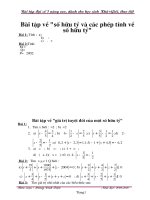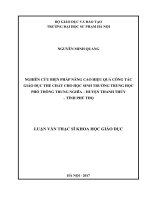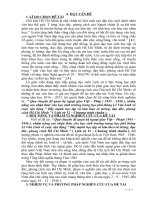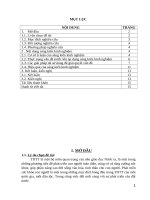English 8 Unit 1 full Ngữ pháp từ vựng
Bạn đang xem bản rút gọn của tài liệu. Xem và tải ngay bản đầy đủ của tài liệu tại đây (1.01 MB, 10 trang )
UNIT 1: LEISURE ACTIVITIES (Các hoạt động giải trí)
A. Getting started
I. Vocabulary:
- check out: kiểm tra lại, xem lại
- trick (n) trò đùa, mẹo
- craft kit (n) bộ đồ nghề làm thủ công
- making craft: làm đồ thủ công
- It’s right up my street (idiom): đúng vị của tôi
- weekend: cuối tuần
- fun: vui, niềm vui
- learn (v) học
- folk song: nhạc dân gian
- tonight: tối nay
- be able to: có thể # be disable to
- improve: cải thiện
- send- sent- sent: gửi
- help (v) giúp đỡ
- easy (adj) dễ dàng => easily (adv)
- like (v) thích = enjoy + V_ing
- read (v) đọc
- short story: truyện ngắn
- hurry: nhanh lên, vội
- need + to V: cần
- have to + V: phải (bắt buộc)
- library (n) thư viện
- bookstore (n) nhà sách
- sports club (n) câu lạc bộ thể thao
- DIY projects : đồ vật tự làm
- texting : nhắn tin
- museum (n) viện bảo tàng
- volunteer (n) tình nguyện viên
- community (n) cộng đồng
II. Bài tập:
Bài 1: Nối:
A. Surfing
B. Making
C. Playing
D. Doing
E. Watching
F. Reading
Bài 2: Sắp xếp từ vựng sao cho có nghĩa:
1. y/o/b/h/b
5.
2. k/i/t/c/r
6.
3. f/t/a/c/r
7.
4. d/n/e/w/k/e/e
8.
- savings: tiền tiết kiệm
- button (n) khuy áo, cúc áo
- to be right up one’s street: hợp với khả năng của ai,
thứ mà ai đó thích
- find – found – found: tìm kiếm, nhận thấy
- everything: mọi thứ, mọi điều,…
- bead (n) hạt (trong chuỗi ngọc)
- sticker (n) hình dán
- wool (n) len
- melody (n) giai điệu
- sure: chắc chắn
- language website: trang web về ngôn ngữ
- comic (n) truyện tranh
- Japanese: tiếng Nhật Bản
- while: khi, trong khi
- stop (v) dừng
- favourite (adj) ưa thích
- bring – brought – brought: mang
- buy – bought – bought: mua
- tool (n) dụng cụ
- wait (v) đợi, chờ đợi
- look for: tìm kiếm
- goldfish (n) cá vàng
- dog training: huấn luyện chó
- pet training: huấn luyện thú cưng
- skateboarding: trượt ván
- mountain biking: đạp xe leo núi
- hobby (n) sở thích
- surf the Internet: lướt Internet
- collect (v) thu nhặt, sưu tầm
a.
b.
c.
d.
e.
f.
The Internet
TV
Books
Crafts
DIY
Computer games
d/n/f/i
k/e/t/s/i/c/r
m/u/e/s/u/m
y/d/o/m/e/l
9. i/g/n/o/a/r/d/a/t/e/s/k
10. y/r/r/b/a/l/i
11. l/t/o/o
12. t/a/w/i
B. A Closer look 1
I. Vocabulary:
- average: trung bình
- leisure (adj) rảnh rỗi
- Relaxing and thinking: Thư giãn và suy nghĩ
- badminton (n) cầu long
- Using the computer for leisure: Sử dụng máy tính để giải trí
- novel (n) tiểu thuyết
- Doing sports and exercise: Chơi thể thao và tập thể dục
- poetry (n) bài thơ
- Reading: Đọc sách
- magazine (n) tạp chí
- Socialising and communicating: Các hoạt động xã giao và giao tiếp - the news (n) tin tức
- Watching TV: Xem TV
- reality show (n) chương trình thực tế
- Other leisure activities: Các hoạt động giải trí
- comedy (n) hài kịch
- Total: tổng
- language (n) ngôn ngữ
- going to local performances: đến xem buổi biểu diễn tại địa phương - collecting stamps: sưu tầm tem
- making origami: xếp giấy origami
- visiting museums: tham quan bảo tang
- performance (n) buổi biểu diễn
- visiting relatives: thăm họ hàng
- hanging out: đi chơi
- going to the cinema: đi xem phim
Bài tập: Điền vào khung cho hợp lí:
a comedy, a skill, hanging out, going to the gym, aerobics, collecting books,
the news, visiting relatives, a book, a language, a poem, judo, chatting, making crafts,
the newspaper, having meals together, gardening, a musical instrument, skating,
a drama, visiting museums, going to a fashion show, doing DIY projects,
volleyball, texting, a game show
1. Going to an event/ place
2. Having hobbies
3. Learning something
4. Playing sports
5. Reading
6. Socializing with friends
7. Spending time with family
8. Watching TV
II. Pronunciation:
C. A Closer look 2:
I. Grammar:
- Các động từ love, like, hate, và prefer có thể đi với cả động từ V-ing hoặc to-V mà không có sự thay đổi nhiều
về nghĩa
Ví dụ: She loves going out with her friends. = She loves to go out with her friends. (Cô ấy thích đi chơi với bạn
bè của mình.)
V_ing
To V or V_ing
enjoy (thích), detest (ghét), fancy (thích), adore (đam
Love (yêu), like (thích), hate (ghét), prefer(thích hơn)
mê), don’t mind (không ngại)
Bài tập 1: Complete the sentences with the to-infinitive or -ing form of the verbs in brackets.
1.
I have enjoyed ___________ (meet) you. Hope ___________ (see) you again soon.
2.
My father is not keen on coffee. He prefers ___________ (drink) tea.
3.
I am a little busy. Would you mind ___________ (wait) a little longer?
4.
Mobile games are great, but I don’t like ___________ (play) them for too long.
5.
If I can choose, I prefer ___________ (stay) at home to ___________ (play) sport.
6.
Tonight I’d like ___________ (go) out, but I have to do my homework.
7.
Sue loves ___________ (make) origami. She can fold some animals, birds and flowers.
8.
I detested ___________ (spend) two hours every day travelling to work and back.
9.
He started ___________ (surf) the net hours ago. Has he stopped ___________ (surf) yet?
10.
I tried hard ___________ (concentrate), but my mind kept ___________ (wander).
Bài tập 2: Complete the correct answer a, b, c or d.
1.
How much time do you spend _______ TV every day?
a. watch
b. to watch
c. watching d. in watching
2.
I’d hate _______ the exams, so I’m doing my best.
a. failing
b. to fail
c. fail d. failed
3.
I always enjoy _______ to my grandfather. He always tells me great stories.
a. to talk
b. to talking c. talking
d. talk
4.
Could you help me _______ the kitchen? It’s a real mess!
a. tidy b. tidied
c. tidying
d. with tidying
5.
Steven dislikes _______, so he usually takes a bus to work.
a. to drive
b. to be driven
c. be driven d. driving
6.
Jane prefers _______ music than to listen to it.
a. playing
b. play c. to play
d. played
7.
Marlene can’t wait _______ to the beach again.
a. to go b. going
c. for going d. go
8.
I really regret _______ this computer – it’suseless.
a. buy b. to buy
c. buying
d. for buying
9.
Your child needs _______ some weight. Tell him _______ less junk food and more exercise.
a. to lose - eat b. to lose - to eat
c. losing - to eat
d. losing - eat
10.
I would love _______ to your party! Thank you for inviting me.
a. come
b. coming
c. to come
d. came
Bài tập 3: Complete the sentences with the correct form (to-infinitive or -ing form) of the verbs in the box.
Some verbs can be followed by either a to-infinitive or an -ing form.
stay
1.
2.
3.
4.
5.
6.
7.
8.
9.
10.
make
watch
do
cycle
eat
hang out
travel
get
read
My brother loves _____________ live football on TV.
Do people in your country like _____________ abroad on vacation?
Riding a bike is Lan’s pleasure, but she detests _____________ in the rain.
I don’t mind _____________ at home to look after the children.
As a child, he hated _____________ books, but now he finds it enjoyable.
Minh is in good shape. He enjoys _____________ sport and exercise.
She doesn’t like _____________ up early in the morning, especially at the weekend.
Emily dislikes _____________ crafts, but she enjoys origami.
I fancy _____________ out tonight because I’m too tired to cook.
Nancy adores _____________ with her best friend Helen.
UNIT 1: LEISURE ACTIVITIES
COMMUNICATION
1.
-
Vocabulary:
Spare time = free time: thời gian rảnh
Window shopping: đồ bày ở cửa hàng.
Animal (n) động vật
Protection (n) sự bảo vệ
Organization (n) tổ chức
To sound weird: có vẻ kì cục
-
Adore (v) mê, yêu thích
Open space: không gian mở
Hooked on drama: thích thú với kịch
Hooked on something: thích thú với cái gì
Cooking: nấu ăn
Tourist (n) khách du lịch
Addict to (v) nghiện
2. Exercises:
EX1: Match the “NetLingo” or “text speak” in the box with the words and phrases below.
n
2moro
u
wd
4
luv
thx
ur
2
cu
@
abt
gr8
btw
r
xx
1. about = ______
2. and = _______
3. are = ______
5. for = _____
6. great = ______
7. kisses = ____
9. love = ______
10. you = ______
11. see you = ___
13. to/two = ______
14. would = _____
15. your = _____
Ex2: Write the correct “netlingo” abbreviation according to its meaning.
WF B4N S2U WBU T2UL EZ
1. easy
3. Same to you
5. Talk to you later
7. By the way
9. enough
11. Oh my God
13. just for fun
15. way fun
____________
____________
____________
____________
____________
____________
____________
____________
THX
J4F FYI LOL NUFF
DYLI
2. What about you?
4. Rye for now
6. tonight
8. for your information
10. Do you love it?
12. Great
14. Thanks
16. Laughing Out Loud
4.
8.
12.
16.
at = ________
by the way = ____
thanks = ______
tomorrow = _____
GR8 BTW OMG 2nite
____________
____________
____________
____________
____________
____________
____________
____________
UNIT 1: SKILL 1
1. READING
- benefit (n) lợi ích
- harmful (adj) có hại
- generation (n) thế hệ
- water (v) tưới cây
- garden (n) vườn
- pick (v)
- the ripe fruit: trái cây chin
- spend (v) dành
- look after: chăm sóc
- virtual (adj) ảo
- rely on: lệ thuộc vào, dựa vào
- technology (n) công nghệ
- past (n) quá khứ
- present (n) hiện tại
- problem (n) vấn đề
- effect (n) ảnh hưởng
- mind (n) trí óc
- body (n) cơ thể
- perhaps: có lẽ
- think – thought – thought: suy nghĩ
- imagine (v) tưởng tượng
- join (v) tham gia vào
- sit – sat – sat : ngồi
- in front of: phía trước
- get out of: rời khỏi, ra khỏi
- even: thậm chí
- walk (v) (n) đi bộ
- world (n) thế giới
- exist (v) tồn tại
- plant (n) thực vật
- seem to: dường như
- worry: lo lắng
- want to V: muốn
- ban (v) cấm
- positive # negative: tích cực # tiêu cực
Fill in each blank with a word from the box.
models
by
through
origami
together
upstream
folding
taught
Origami is the Japanese word for paper (1)__________. ORI means to fold and KAMI means paper.
(2)__________, they form the word, “origami.” It is an art form that has been handed down from parent to child
(3)__________ many generations. Origami involves the creation of paper forms usually entirely (4)__________
folding. Animals, birds, fish, geometric shapes, puppets, toys and masks are among the (5)__________ that
even very young children can learn to make in just one sitting.
In Japan, at one time origami was (6)__________ in schools but today, children are generally taught origami
at home. Holidays are celebrated with colorful (7)__________ decorations made by the family. On children’s
day (formerly boy’s day), children make colorful carp: a fish that swims (8)__________, against the current.
This symbolizes strength.
2. SPEAKING:
- Giving an opinion:
- agree (v) đồng ý, tán thành
I think that…( Tôi nghĩ rằng…)
- disagree (v) không đồng ý, không
In my opinion,… (Theo ý kiến của tôi,…)
tán thành
- Ask for an opinion:
- spend + V_ing: dành thời gian để
What do you think? (Bạn nghĩ gì?)
làm gì
How do you feel about that? (Bạn cảm thấy như thế nào về điều này?) - go out: ra ngoài
- eyes: đôi mắt
- Agreeing:
I agree with you (Tôi đồng ý với bạn)
- tired (adj) mệt mỏi
It’s so true/ Exactly (Chính xác)
- train (v) rèn luyện, huấn luyện
- memory (n) trí nhớ
- Disagreeing:
I afraid I don’t agree (Tôi rất tiếc rằng tôi không đồng ý)
- a lot of = lots of : nhiều
I don’t think so. (Tôi không nghĩ thế)
- persuade (v) thuyết phục
- solution (n) giải pháp
UNIT 1: SKILL 2: WRITING
- Irritate (v) làm phát cáu, bực tức
Introducing your opinion
In my opinion,
- Limit (v) giới hạn
I believe
Explaning your opinion
Firstly, secondly, thirdly, finally
Besides, also, in addition
Concluding/ Summarising your opinion
For these reasons,
In shor,
As I have noted,
Bài tập 1: Write questions for the underlined parts.
1. A:______________________________________________________________________
B: My mother watches films every afternoon.
2. A: _____________________________________________________________________
B: They went to the movies yesterday evening.
3. A: _____________________________________________________________________
B: I love hanging out with my best friend Helen.
4. A: _____________________________________________________________________
B: I don’t give my personal information to websites because it’s easy to be stolen.
5. A: _____________________________________________________________________
Children should spend less than 2 hours a day on screens.
6. A: _____________________________________________________________________
B: Do-it-yourself (DIY) is the most popular pastime in my country.
7. A: _____________________________________________________________________
B: The art of paper folding originated in China.
8. A: _____________________________________________________________________
B: 1 vs 100 game show lasts ninety minutes.
Bài tập 2: Write sentences with the cues given.
1. Mai/ usually/ listen/ K-pop music/ free time.
___________________________________________________________________________
2. when/ I/ be/ a child/ I/ enjoy/ play/ computer games.
___________________________________________________________________________
3. my father/ spend/ most/ spare time/ look after/ the garden.
___________________________________________________________________________
4. watching TV/ most/ popular/ leisure activity/ Britain?
___________________________________________________________________________
5. many teenagers/ addicted/ the Internet/ computer games.
___________________________________________________________________________
Bài tập 3: Điền từ trong ô vào khoảng trống. Hơn một từ có thể phù hợp với một vài khoảng trống
Regular exercise brings us many benefìts. (1) ____________, it helps to reduce the risk of obesity. (2)
____________, it lowers blood pressure and cholesterol levels. (3) ____________, the likelihood of heart
disease is lower. (4) ____________, exercise makes your muscles and bones stronger. (5) ____________, if you
exercise regularly, you will have less depression and anxiety as well. (6) ____________ it is very important to
invest time in doing this to improve the quality of your daily life.
TEST
I.
1.
2.
3.
4.
5.
II.
1.
2.
3.
4.
5.
6.
III.
1.
Choose the word whose underlined part is pronounced differently from the others.
a. sound
b. out
c. found
d. enough
a. bracelet
b. favourite
c. craft
d. game
a. leisure
b. sure
c. shopping
d. socialise
a. trick
b. kit
c. addict
d. virtual
a. satisfied
b. hooked
c. bored
d. socialised
Choose the odd one out.
a. socializing
b. communicating
c. hanging out
d. skateboarding
a. having savings
b. collecting stamps c. making origami
d. doing DIY
a. a thriller
b. a comedy
c. a skill
d. a reality show
a.J4F
b. 2moro
c. tonight
d. goin’
a. magazine
b. mobile game
c. newspaper
d. book
a. virtual
b. harmful
c.creative
d. leisure
Choose the best answer a, b, c or d to complete the sentence.
How much time do you spend _______ leisure activities?
a.on
b. in
c. for
d. with
2. Why don’t you apply for this job? It looks right _______ your street.
a.on
b. in
c.at
d. up
3. Many young people don’t _______ walking to school or playing active games?
a. prefer
b. enjoy
c. suggest
d. want
4. Daisy is _______ social media. She spends lots of time on Facebook and Instagram.
a.tired of
b. bored with
c. addicted to
d. curious about
5. _______ leisure time is free from compulsory activities, it is often referred to as “free time.’
a. Because
b. Although
c. When
d. As long ass
6. On YouTube you can find many videos on _______ all aspects of your English.
a. surfing
b. working
c. taking
d. improving
7. Some addicts are teenagers _______ are hooked on computer games.
a. which
b. who
c. what
d. whose
8. My sister enjoys _______. She usually walks around the mall, but not buying anything.
a. going shopping
b. hanging out
c. window shopping d. doing DIY
9. You can raise a _______ pet like a Neopet if you aren’t allowed to own a real pet.
a. domestic
b. virtual
c. weird
d. beloved
10. “My favourite leisure activity is people watching.” “_______”
a. That sounds so weird!
b. That’s all right.
c. OK. That’s what you’ve chosen.
d. Sure. It’s very entertaining.
IV. Choose the underlined part A, B, C or D that needs correcting.
1. Having leisure activities are truly important to the elderly.
A
B
C
D
2. Although she wanted to go to the museum, she decidedstaying at home.
A
B
C
D
3. Parents are concerned that their kids may be spending too many time on screens.
A
B
C
D
4. Collecting coins is exciting, but it can also be relaxed.
A
B
C
D
5. Cloud watching sound weird, but Hang adores it.
A
B
C
D
6. For some young people, enjoyment involves sitting in front a computer playing games.
A
B
C
D
7. His parents are thinking of banning him on using the computer.
A
B
C D
8. When you game online, be carefully when making friends with strangers.
A
B
C
D
V. Write the correct form or tense of the verbs in brackets.
1. At present, the social networks ______________ (become) more popular among young generation.
2. I ______________ (not listen) to their new CD yet. Is it any good?
3. When I was a student, I ______________ (not like) doing homework.
4. Facebook ______________ (found) in 2004 by Mark Zuckerberg and Eduardo Saverin.
5. The American ______________ (spend) 34 hours a week watching television.
6. ______________ (you/ ever/ make) origami cranes?
7. I’ve just bought a new CD of folk songs. I ______________ (listen) to it tonight.
8. Do you adore ______________ (lie) in a hot bath?
9. Please try ______________ (arrive) punctually at 8.30.
10. Many teenagers prefer ______________ (watch) TV to ______________ (read) books.
VI. Supply the correct form of the words in brackets.
1. The Internet is very ______________, it takes up a lot of our time. (addict)
2. I enjoy ______________ with friends and going out at the weekend. (social)
3. Sitting in front of the computer too long can cause ______________. (obese)
4. Are you ______________ about the new Gears Of War games? (excite)
5. She listens to classical music for ______________. (relax)
6. The Internet has changed the English language ______________. (consider)
7. She was ______________ with her job and decided to look for a new one. (satisfy)
8. Face to face ______________ is better than Skype video calls. (communicate)
VII. Read the passage carefully, then choose the correct answers.
The latest addiction to trap thousands of people is the Internet, which has been blamed for broken
relationships, job losses, financial ruin, and even suicide. Psychologists now recognize Internet Addiction
Syndrome (IAS) as a new illness that could cause serious problems and ruin many lives.
IAS is similar to other problems like gambling, smoking and drinking: addicts have dreams about the
Internet; they need to use it first thing in the morning; they lie to their parents and partners about how much
time they spent online; they wish they could cut down, but are unable to do so. A recent study found that many
users spend up to 40 hours a week on the Internet. Some of the addicts are teenagers who are already hooked on
computer games and who find it very difficult to resist the games on the Internet.
1. What is the best title of the passage?
a. The advantage of the Internet
b. Hooked on the Net
c. Impact of Internet on teens
d. A guide to the Internet
2. According to the writer, internet addiction __________.
a. is not the same as gambling
b. is not an illness
c. can lead to financial problems
d. helps people kill time
3. Internet addicts find it hard ___________.
a. to use the Internet in the morning
b. to lie about the time they spent online
c. to spend more time on the Internet
d. to spend less time on the Internet
4. The word ‘it’ in paragraph 2 refers to ___________.
a. the Internet
b. IAS
c. dream
d. computer
5. Which of the followings is NOT true?
a.IAS is recognised as a new illness.
b.Internet addiction can cause suicide behaviours.
c.Many internet addicts spend more than 40 hours a week online.
d.Teenagers who are hooked on computer games can suffer from IAS.









